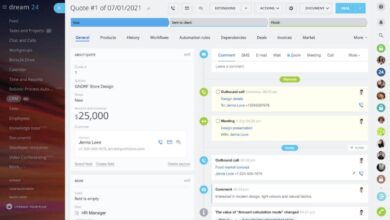Enterprise CRM Solutions with AI and Analytics: 7 Game-Changing Benefits
In today’s hyper-competitive business landscape, enterprise CRM solutions with AI and analytics are no longer a luxury—they’re a necessity. These intelligent systems transform customer data into actionable insights, driving smarter decisions and deeper relationships.
1. Understanding Enterprise CRM Solutions with AI and Analytics

Enterprise CRM solutions with AI and analytics represent the next evolution in customer relationship management. Unlike traditional CRM systems that primarily store contact information and track interactions, modern platforms leverage artificial intelligence (AI) and advanced analytics to predict behavior, automate workflows, and deliver hyper-personalized experiences at scale.
What Sets AI-Powered CRM Apart?
Traditional CRM systems are reactive—they record what has already happened. In contrast, enterprise CRM solutions with AI and analytics are proactive. They anticipate customer needs, recommend next-best actions, and surface insights before issues arise.
- Predictive lead scoring: AI models analyze historical data to rank leads by conversion probability.
- Automated data entry: Natural language processing (NLP) extracts key details from emails and calls, reducing manual input.
- Real-time sentiment analysis: AI evaluates customer tone during interactions to alert agents of dissatisfaction.
“AI doesn’t replace human intuition in sales—it amplifies it by removing guesswork and focusing effort where it matters most.” — Gartner Research, 2023
Core Components of Modern CRM Architecture
Enterprise CRM solutions with AI and analytics are built on a modular, cloud-native architecture that integrates multiple technologies. Key components include:
- Centralized customer data platform (CDP): Aggregates data from sales, marketing, service, and external sources into a single customer view.
- Machine learning engine: Powers predictive models for churn, upsell opportunities, and customer lifetime value.
- Analytics dashboard: Visualizes KPIs, trends, and AI-generated recommendations in real time.
- Workflow automation: Triggers actions like follow-up emails, task assignments, or service tickets based on AI insights.
These components work in concert to create a self-optimizing system that learns from every interaction. For example, Salesforce’s Einstein AI uses deep learning to suggest optimal call times, while Microsoft Dynamics 365 leverages Azure AI for real-time customer sentiment tracking during service calls. You can explore more about Salesforce’s AI capabilities here.
2. The Role of AI in Enterprise CRM Solutions with AI and Analytics
AI is the engine that transforms static CRM data into dynamic business intelligence. In enterprise CRM solutions with AI and analytics, AI doesn’t just automate—it anticipates, personalizes, and optimizes every customer touchpoint.
AI-Driven Sales Forecasting and Pipeline Management
One of the most impactful applications of AI in CRM is sales forecasting. Traditional forecasting relies on historical averages and manual input, often leading to inaccuracies. AI-powered forecasting, however, analyzes thousands of variables—including deal stage, communication frequency, customer sentiment, and external market trends—to generate highly accurate predictions.
- Reduces forecast error rates by up to 40% (McKinsey, 2022).
- Identifies stalled deals and recommends intervention strategies.
- Simulates multiple sales scenarios to guide strategic planning.
For instance, Oracle’s CX Sales uses AI to analyze email patterns and meeting outcomes to predict deal closure likelihood. This allows sales managers to prioritize coaching and resources on high-risk opportunities.
Intelligent Customer Service Automation
AI-powered chatbots and virtual agents are now standard in enterprise CRM solutions with AI and analytics. But beyond basic FAQ handling, modern AI systems can resolve complex issues, escalate to human agents seamlessly, and even learn from each interaction to improve future responses.
- Conversational AI: Platforms like Zendesk Answer Bot use NLP to understand customer intent and provide context-aware responses.
- Case classification: AI automatically categorizes and routes support tickets to the right team based on content and urgency.
- Knowledge base optimization: AI identifies gaps in help content by analyzing unresolved queries.
According to a study by IBM, companies using AI in customer service report a 30% reduction in resolution time and a 25% increase in customer satisfaction.
3. How Analytics Transforms Enterprise CRM Solutions with AI and Analytics
While AI provides the intelligence, analytics delivers the visibility. In enterprise CRM solutions with AI and analytics, data analytics turns raw customer interactions into strategic insights that drive growth, retention, and operational efficiency.
Real-Time Dashboards and Executive Insights
Modern CRM platforms offer customizable dashboards that display real-time KPIs such as sales velocity, customer acquisition cost (CAC), and net promoter score (NPS). These dashboards are not just for executives—they’re accessible across departments, enabling data-driven decisions at every level.
- Marketing teams monitor campaign ROI and lead conversion rates.
- Sales leaders track team performance and forecast accuracy.
- Service managers analyze first response time and resolution rates.
For example, HubSpot’s analytics suite allows users to create drag-and-drop dashboards that combine CRM data with web analytics, providing a holistic view of customer journeys. Learn more at HubSpot Analytics.
Predictive Analytics for Customer Retention
One of the most powerful uses of analytics in enterprise CRM solutions with AI and analytics is churn prediction. By analyzing behavioral patterns—such as reduced login frequency, support ticket spikes, or contract renewal delays—AI models can flag at-risk customers before they leave.
- Enables proactive retention campaigns (e.g., personalized offers or check-in calls).
- Identifies root causes of churn across segments.
- Calculates customer lifetime value (CLV) to prioritize high-value accounts.
A case study from Adobe revealed that their AI-driven churn model improved retention by 18% within six months of deployment. This demonstrates how predictive analytics directly impacts bottom-line results.
4. Key Features of Enterprise CRM Solutions with AI and Analytics
Not all CRM systems are created equal. Enterprise CRM solutions with AI and analytics stand out through a combination of advanced features designed to scale with large organizations and complex customer ecosystems.
Unified Customer 360 View
A true 360-degree customer view integrates data from every touchpoint—website visits, email opens, purchase history, service interactions, and social media engagement. This unified profile enables personalized experiences across channels.
- Breaks down data silos between sales, marketing, and service.
- Enables dynamic segmentation based on real-time behavior.
- Supports omnichannel engagement (email, chat, phone, social).
For example, SAP Customer Experience combines CRM with IoT data from connected products to anticipate maintenance needs and trigger service appointments automatically.
AI-Powered Marketing Automation
Enterprise CRM solutions with AI and analytics go beyond basic email automation. They use AI to optimize send times, personalize content, and predict which offers will resonate with each customer.
- Dynamic content generation: AI creates personalized subject lines and product recommendations.
- Journey orchestration: Automates multi-step campaigns based on customer behavior (e.g., cart abandonment + browsing history).
- Attribution modeling: Uses machine learning to determine which marketing channels drive conversions.
Marketo, now part of Adobe, uses AI to score leads and recommend optimal engagement sequences, increasing conversion rates by up to 35%.
Advanced Reporting and Custom Analytics
Enterprises need more than pre-built reports—they require customizable analytics that align with unique business goals. Enterprise CRM solutions with AI and analytics offer:
- SQL-like query tools for deep data exploration.
- Integration with BI platforms like Tableau and Power BI.
- Custom KPIs and scorecards tailored to departmental objectives.
These capabilities empower data analysts to uncover hidden trends, such as seasonal buying patterns or cross-sell opportunities within specific industries.
5. Leading Enterprise CRM Solutions with AI and Analytics
Several vendors dominate the market for enterprise CRM solutions with AI and analytics. Each offers unique strengths depending on industry, integration needs, and AI maturity.
Salesforce Einstein: The AI Pioneer
Salesforce has been a trailblazer in embedding AI into CRM. Einstein AI powers features across Sales Cloud, Service Cloud, and Marketing Cloud, offering:
- Predictive lead and opportunity scoring.
- Automated case classification and routing.
- Next-best-action recommendations for sales reps.
Einstein GPT, introduced in 2023, uses generative AI to draft emails, summarize cases, and generate reports in natural language. This reduces administrative burden and increases productivity. Explore Salesforce’s AI innovations here.
Microsoft Dynamics 365: Seamless Integration with AI
Microsoft Dynamics 365 stands out for its deep integration with the Microsoft 365 ecosystem. Its AI capabilities, powered by Azure Cognitive Services, include:
- Sentiment analysis during Teams calls.
- Predictive maintenance for field service operations.
- AI-driven demand forecasting in supply chain modules.
For organizations already using Office 365, Dynamics 365 offers a low-friction path to AI-enhanced CRM. Its analytics tools are tightly coupled with Power BI, enabling rich visualizations and self-service reporting.
Oracle CX: AI for B2B and B2C
Oracle’s Customer Experience (CX) suite is designed for large enterprises with complex customer journeys. Its AI engine, Adaptive Intelligent Apps, delivers:
- Real-time product recommendations.
- Churn prediction with prescriptive actions.
- Automated social media monitoring and response.
Oracle’s strength lies in its ability to handle both B2B and B2C use cases at scale, making it ideal for conglomerates with diverse business units.
6. Implementation Challenges and Best Practices
Deploying enterprise CRM solutions with AI and analytics is not without challenges. Success depends on strategic planning, data quality, and organizational readiness.
Data Quality and Integration Hurdles
AI and analytics are only as good as the data they consume. Common data issues include:
- Incomplete or outdated customer records.
- Duplicate entries across systems.
- Disconnected data sources (e.g., ERP, e-commerce, social media).
Best practices to overcome these include:
- Conducting a data audit before implementation.
- Establishing a master data management (MDM) strategy.
- Using AI-powered data cleansing tools to standardize and enrich records.
According to a McKinsey report, companies with high data quality see 2.5x greater ROI from AI initiatives.
Change Management and User Adoption
Even the most advanced CRM system fails if users don’t adopt it. Resistance often stems from fear of job displacement or complexity.
- Provide hands-on training with real-world scenarios.
- Highlight time-saving benefits (e.g., AI automating data entry).
- Appoint internal champions to drive adoption.
A phased rollout—starting with a pilot group—can help identify pain points and refine processes before enterprise-wide deployment.
7. Future Trends in Enterprise CRM Solutions with AI and Analytics
The evolution of enterprise CRM solutions with AI and analytics is accelerating. Emerging technologies are reshaping how businesses engage with customers and leverage data.
Generative AI and Natural Language Interfaces
Generative AI is transforming CRM by enabling natural language interactions. Users can now ask, “Show me all high-risk accounts in the healthcare sector,” and the system generates a report instantly.
- AI assistants draft emails, summarize meetings, and create follow-up tasks.
- Customers interact with voice-enabled CRM bots for self-service.
- Marketing teams use AI to generate campaign copy and ad variations.
As generative AI matures, we’ll see CRM systems that not only respond to queries but proactively suggest strategies based on market shifts.
Hyper-Personalization at Scale
Future CRM systems will deliver individualized experiences to millions of customers simultaneously. AI will analyze micro-behaviors—like mouse movements or video watch time—to infer intent and tailor content in real time.
- Dynamic pricing based on customer value and demand.
- Personalized onboarding journeys for new users.
- AI-curated content feeds in customer portals.
This level of personalization will blur the line between automation and human touch, creating seamless, empathetic experiences.
AI Ethics and Data Privacy in CRM
As AI becomes more pervasive, ethical concerns around bias, transparency, and consent are growing. Enterprises must ensure their CRM AI models are:
- Trained on diverse, representative data to avoid bias.
- Auditable, with clear explanations for AI-driven decisions.
- Compliant with regulations like GDPR and CCPA.
Forward-thinking companies are appointing AI ethics officers and implementing “explainable AI” frameworks to build trust with customers and regulators.
What are enterprise CRM solutions with AI and analytics?
Enterprise CRM solutions with AI and analytics are advanced customer relationship management platforms that use artificial intelligence and data analytics to automate processes, predict customer behavior, and deliver personalized experiences at scale. They integrate sales, marketing, and service data to provide a unified view of the customer.
How does AI improve CRM systems?
AI enhances CRM systems by automating repetitive tasks (like data entry), predicting customer behavior (such as churn or upsell opportunities), and providing real-time recommendations. It enables smarter decision-making, improves efficiency, and increases customer satisfaction through personalization.
Which CRM has the best AI capabilities?
Salesforce Einstein is widely regarded as having the most mature AI capabilities, especially with the introduction of Einstein GPT for generative AI. Microsoft Dynamics 365 and Oracle CX also offer robust AI features, particularly in integration and B2B contexts.
Can small businesses use AI-powered CRM?
Yes, many AI-powered CRM features are now available in mid-tier and even small business plans. Platforms like HubSpot and Zoho CRM offer AI tools for lead scoring, email automation, and chatbots at affordable prices, making AI accessible beyond just large enterprises.
What are the risks of AI in CRM?
Risks include data privacy violations, algorithmic bias, over-reliance on automation, and lack of transparency in AI decisions. To mitigate these, companies must prioritize data governance, conduct regular audits, and ensure human oversight in critical customer interactions.
Enterprise CRM solutions with AI and analytics are revolutionizing how organizations manage customer relationships. By combining the power of artificial intelligence with deep data insights, these systems enable businesses to anticipate needs, personalize interactions, and drive growth with unprecedented precision. From Salesforce to Microsoft Dynamics, leading platforms are embedding AI into every aspect of the customer journey. However, success requires more than just technology—it demands clean data, strategic implementation, and a commitment to ethical AI use. As generative AI and hyper-personalization reshape the landscape, enterprises that embrace these innovations will gain a lasting competitive edge. The future of CRM isn’t just about managing relationships—it’s about predicting and enriching them before the customer even speaks.
Further Reading:






